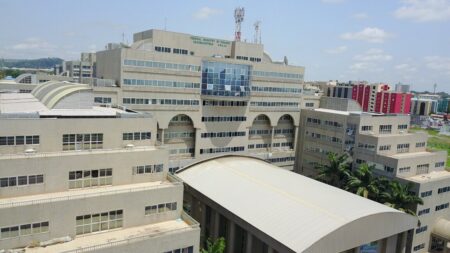Who is Nigeria’s Minister of Finance?
Mr. Wale Edun is the present Minister of Finance and the Coordinating Minister of the Economy. He was the former Commissioner of Finance in Lagos.
Understanding the Federal Ministry of Finance
Between 2015 to 2019, there was a Ministry of Budget and Planning, but the second term of President Muhammadu Buhari merged it with the Ministry of Finance. Until May 29, 2023, it was known as the Federal Ministry of Finance, Budget, and National Planning.
On assumption of office, President Bola Tinubu made Finance an independent ministry, now known as the Federal Ministry of Finance. The Budget and Economic Planning now stands as an independent ministry.
The ministry prepares an annual budget for the federal government and oversees the implementation of the budget and fiscal policies among other core functions of Finance Minister in Nigeria.
The ministry also releases economic statistics as it relates to inflation and purchasing power and maintains the debt profile of the government and the modality of repayment
It carries most of its budget roles through the Budget Office of the federation and keeps a tap on the amount allocated to debt financing through another agency, Debt Management Office (DMO).
The Ministry of Finance also manages the monies generated through importation duties by Nigeria Customs Service (NCS).
The decision to transfer NCS to the Ministry of Finance in 1992 was because of the revenue the para-military organisation generated monthly and yearly.
Parastatal:
Below is the list of agencies under the Ministry of Finance and the year they were established:
| Finance Parastatal | Year of Establishment |
| Federal Inland Revenue Service (FIRS) | 1943 |
| Nigeria Customs Service (NCS) | 1891 |
| Debt Management Office (DMO) | October 4, 2000 |
| Office of the Accountant-General of the Federation | 1988 |
| Nigerian Export-Import Bank [NEXIM] | July 1, 1991 |
| Investments and Securities Tribunal | December 19, 2002 |
| Securities and Exchange Commission (SEC) | 1979 |
| Nigerian Sovereign Investment Authority | May 27, 2011 |
| Pension Transitional Arrangement Directorate | August 2013 |
| Family Homes Fund | September 2016 |
| Development Bank of Nigeria (DBN) | September 2014 |
| Nigeria Deposit Insurance Corporation (NDIC) | June 15, 1988 |
| National Economic Reconstruction Fund (NERF) | 1988 |
| National Insurance Commission (NIC) | 1997 |
Key roles of the agencies of Nigeria’s Ministry of Finance, Budget, and National Planning
Federal Inland Revenue Service (FIRS)
To increase and collect tax on behalf of the federal government. To issue tax Identification Numbers (TIN) to companies and individuals.
To collect stamp duties in Nigeria on behalf of the government
National Bureau of Statistics (NBS)
To generate and release economic statistics in Nigeria
Nigeria Customs Service (NCS)
To collect import duties, check inward and outward of goods and movement of people out and in the country
Office of the Accountant-General of the Federation
To initiate and formulate the implementation of policies regarding the management of public funds
Nigerian Export-Import Bank [NEXIM]
To develop and expand the non-oil sectors of the economy in order to reduce Nigeria’s reliance on oil revenue
Investments and Securities Tribunal
To settle all matters arising out of investments and securities transactions.
Securities and Exchange Commission (SEC)
To regulate the Nigerian capital market
Nigerian Sovereign Investment Authority
To manage Nigeria’s income from oil exports (sovereign wealth fund) for the rainy days
Pension Transitional Arrangement Directorate
To address the numerous pensioners’ complaints
Family Homes Fund
To use housing to improve the living standards of Nigerians on low income by building quality homes
Development Bank of Nigeria (DBN)
To be a go-to for MSMEs and small Corporates in Nigeria through the provision of financing and credit facility
Nigeria Deposit Insurance Corporation (NDIC)
To protect depositors in financial institutions in Nigeria. When a bank is insolvent and heading towards collapse, NDIC steps in to make sure that depositors and shareholders do not lose their monies and shares
National Economic Reconstruction Fund (NERF)
To serve as a funding mechanism to bridge the gap in the provision of local and foreign funds to small and medium-scale enterprises in Nigeria.
National Insurance Commission (NIC)
To ensure effective administration, supervision, regulation and control of the insurance business in Nigeria
The head office of the ministry of finance is located at the Central Business District, Abuja, Nigeria
Social handles:
- Twitter: @FinMinNigeria
- Facebook.com: @Finminnigeria
- Official website: finance.gov.ng
Performance
The most effective of all the agencies are Budget Office and the Nigeria Deposit Insurance Corporation (NDIC) which has diligently stepped in to protect depositors and shareholders in the financial sectors.
Most times, it issues guidelines on how depositors can retrieve their money when a bank closes shops.
Like every other ministry in Nigeria, some of the agencies under the Federal Ministry of Finance, Budget, and National Planning look like they were established to create jobs for family members and political allies.
For instance, the Pension Transitional Arrangement Directorate which was established to address the numerous pensioners’ complaints in Nigeria is still one of the ineffective agencies as retired civil servants are still finding it difficult to get pensions and other benefits.
NEXIM and DBN need to do more. The ministry needs to thoroughly supervise the activities of Nigeria Customs for better performance.

